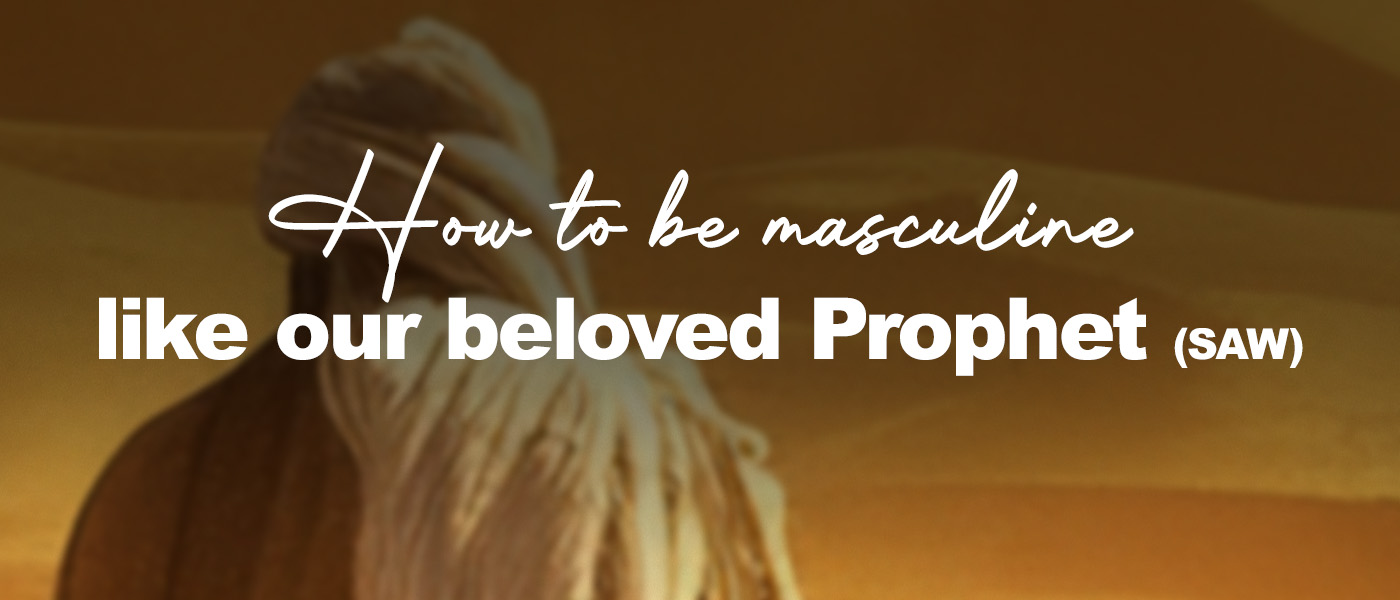Today’s world is full of conflicting messages about what it means to “be a man.” Social media throws out extremes such as on one side, the loud, aggressive, “alpha male” persona that equates masculinity with dominance, control, and emotional coldness. On the other side, there’s a push to completely soften or blur masculine traits altogether. If you’re a young Muslim trying to figure out your identity, it’s easy to feel stuck in the middle. Where’s the balance? How are we supposed to define masculinity as Muslims?
Let’s take it back to the best role model we’ve ever had, and that is none other than Prophet Muhammad (SAW), who is the most complete example of a man because of his emotional intelligence, spiritual strength, physical capability, deep compassion, and unwavering sense of justice.
In a time when masculinity is being either glorified or vilified, the Sunnah gives us clarity.
Strength and gentleness are not opposites, but complements
Prophet Muhammad (SAW) was known for his physical strength as there are ahadith which mention that he (SAW) wrestled, rode horses, led in battle, and once even carried heavy stones during the construction of the Masjid in Madinah. But his strength was never used to dominate, only to defend and uplift. He (SAW) said, “The strong man is not the one who can wrestle well, but the one who can control himself when he is angry.” (Sahih Bukhari)
Real masculinity in Islam isn’t about empowering others, it’s about mastering yourself. Control, not chaos. Emotional intelligence, not emotional outbursts.
As a husband, he (SAW) displayed compassion over control
In his marriage, the Prophet (SAW) never used authority as a weapon. He (SAW) consulted his wives, helped around the house, and never struck or shouted at them. Lady Ayesha bint Abu Bakr said, “He (SAW) used to serve his family and, when the time for prayer came, he (SAW) would go out to pray.” (Sahih Bukhari)
In a world where “manliness” is often tied to being emotionally distant or “too busy” for family, the Prophet (SAW) modeled the opposite. He (SAW) was present. He (SAW) listened. He (SAW) smiled. He (SAW) supported. That’s masculinity with ihsaan.
The brotherhood and loyalty of the Prophet (SAW)
The Prophet (SAW) built a strong brotherhood among the Sahabah, and these were men who loved each other for the sake of Allah (SWT). Their masculinity wasn’t about mocking emotions or flexing dominance. It was about supporting one another with sincerity, loyalty, and dua. He (SAW) said, “None of you truly believes until he loves for his brother what he loves for himself.” (Sahih Bukhari)
True masculinity in Islam includes compassion, honor, and empathy as these are qualities that build real strength, not just surface toughness.
The Prophet’s (SAW) leadership and its characteristics
The Prophet (SAW) led his people with courage, but without arrogance. He (SAW) made decisions with shura, carried the burden of others, and never demanded privilege. When the Prophet (SAW) entered Makkah during the Fath, he (SAW) didn’t boast. He (SAW) didn’t take revenge. He (SAW) lowered his head in humility and forgave his enemies. That’s a man of power and principle.
Allah (SWT) says in Surah Al-Furqaan, “The ˹true˺ servants of the Most Compassionate are those who walk on the earth humbly, and when the foolish address them ˹improperly˺, they only respond with peace.” (The Clear Quran®, 25:63)
Real masculinity isn’t about ego, it’s about leading with justice and mercy.
The Prophet (SAW) was not afraid to feel emotions
In many cultures, men are told to “man up,” which usually means “shut down.” Emotions like sadness or grief are viewed as weakness. But the Prophet (SAW) cried when his son Ibrahim passed away. He (SAW) openly expressed love for his family and companions. He (SAW) wasn’t ashamed to feel or show it.
When asked about his tears, the Prophet (SAW) said, “This is mercy. The eyes shed tears and the heart grieves, but we do not say except what pleases our Lord.” (Sahih Bukhari)
He (SAW) didn’t suppress emotions, but rather regulated them by guiding them with the fear of Allah (SWT).
That’s emotional intelligence, not weakness.
Discipline and purpose are the core of Prophetic masculinity
The Prophet (SAW) woke up early, prayed with consistency, fasted regularly, and kept his goals tied to the akhirah. He (SAW) didn’t live to impress people, he (SAW) lived to please Allah (SWT). He (SAW) said, “Be in this world as if you were a stranger or a traveler.” (Sahih Bukhari)
A real man isn’t someone chasing status, clout, or luxuries. A real man is anchored, he knows where he’s going, why he’s here, and to Whom he is accountable.
Rethinking the role models we follow
Right now, we live in a time where influencers, podcasters, and self-proclaimed “alpha males” are shaping the way young men think about masculinity. Some encourage discipline and growth, but others promote misogyny, pride, or rebellion against Islamic values.
Be careful who you let influence your mind and heart. Allah (SWT) says in Surah Al-Ahzab, “Indeed, in the Messenger of Allah you have an excellent example for whoever has hope in Allah and the Last Day, and remembers Allah (SWT) often.” (The Clear Quran®, 33:21)
Your role model shouldn’t be someone who’s needing millions of followers, he should be following the path of Allah (SWT).
The Prophet (SAW) espoused the perfect balance of strength and softness, courage and mercy, and leadership and humility. He (SAW) showed that true manhood doesn’t need to shout. It’s confident, calm, and connected to Allah (SWT). So if you’re trying to figure out what it means to “be a man” in today’s chaotic world, go back to the Sirah. Study how he (SAW) lived, how he (SAW) treated others, how he (SAW) handled hardship, and how he (SAW) led with love and purpose.
Masculinity in Islam isn’t a reaction to culture, it’s a reflection of the Prophet (SAW). And there is no better example to follow.


